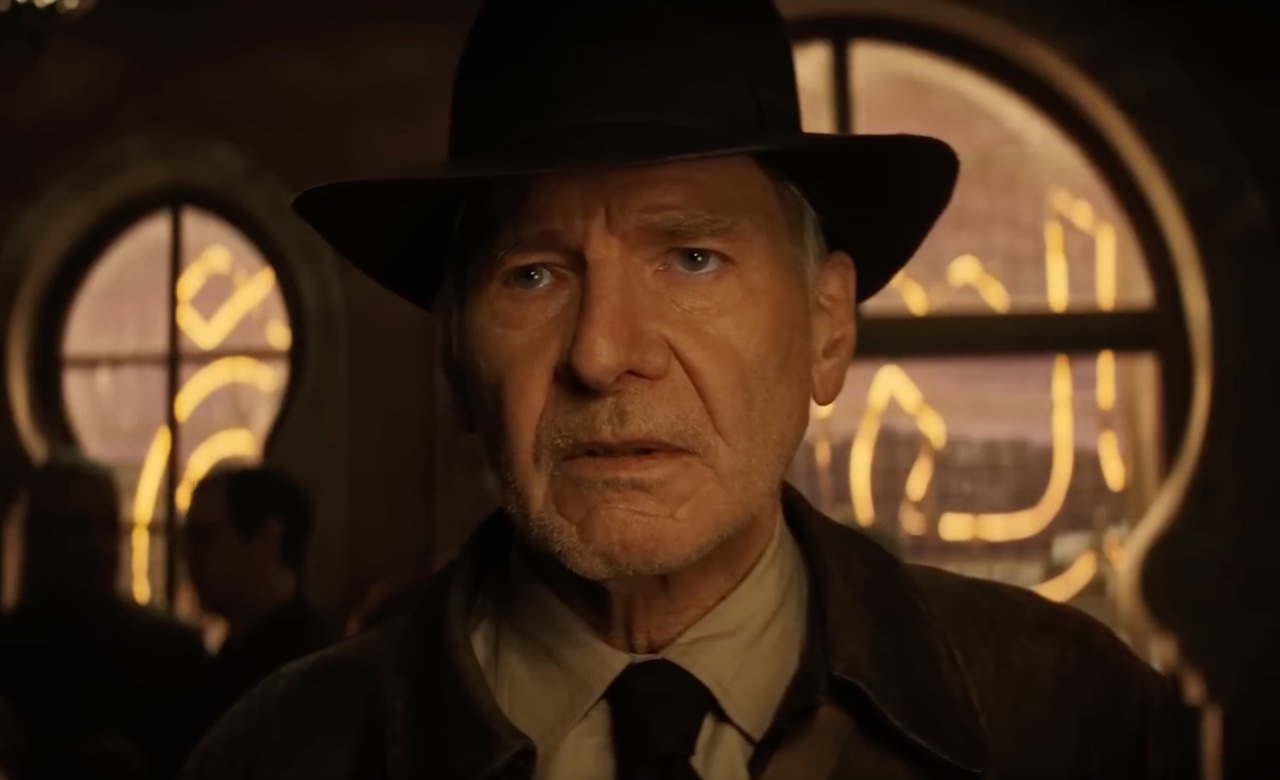Everyone has at least one friend with a racist grandparent. They’ll scream and shout about how the Mexicans are moving into the neighborhood or bitch about the white devils down the street. They’re not out there actively wearing clan hoods or marching in hate demonstrations, but they’re not above dropping the occasional racial slur. Many people tend to excuse racism among the elderly as a product of the way they were raised. “My granny’s from a different time,” your friend will tell you after spending twenty minutes trapped in her kitchen while she blames the Jews for 9/11. “She’s not a hate-monger, she just doesn’t know any better,” your friend will say. Until now, that’s an excuse I’ve never really bought into. But Eastwood makes a rather compelling case for it in his new grandpa gets revenge flick Gran Torino.
Korean war vet Walt Kowalski (Clint Eastwood) is everybody’s angry, racist grandpa crossed-bred with gun-toting Mr. Strickland from Back to the Future. His wife has recently died and he’s the last white person left in an old neighborhood which has long since been repopulated with immigrants. We never see Walt’s life with his wife, but he speaks of her with reverence. Presumably she was a stabilizing influence. Without her he’s anger, bitterness and loneliness personified; a sour-faced ogre who seems to hate everyone and everything around him. He sits day after day on his porch guzzling beer, scowling at his neighbors and calling them the most vicious ethnic slurs imaginable. His relationship with his greedy, selfish family is little better. After a long life Walt has no tolerance left for laziness or fools. “Pussy!” he snarls whenever someone fails to live up to his expectations. He wouldn’t be out of place running into the street, firing off a shotgun and screaming “slackers!” at passing children, and at first it seems that a bitter, fed-up, racist husk is all that’s left of craggy-faced old Walt.
Walt may have a low opinion of the world, but he’s a man of principal and character. When gangbangers rough up the quiet Hmong (people from Southeast Asia) family next door, he drives them off with a rifle in a classic, Eastwood, badass standoff. His grateful neighbors don’t buy it when he growls that he simply didn’t want them on his lawn, and Walt wakes up the next morning to discover his porch littered with gifts. Walt isn’t interested in their friendship at first, but eventually he starts to see some value in Thao and Sue, the Lor family’s well-behaved kids, a marked contrast to his own self-absorbed grandchildren. Soon even he gets sick of all the constant loneliness and Walt accepts an invite to dinner where he develops an affinity for Hmong food.
In another film, this is the spot where hard-bitten racist Walt would be magically transformed into old softie. The movie would end with him weeping and perhaps reconnecting with his son. Well forget it. That never happens in Gran Torino and maybe that’s why it’s so damn good. There’s obvious affection between Walt and his neighbors but he stays the same unforgiving, bitter, aged badass he is at the beginning of the film. Rather than them changing him, he sets out to change them by taking Thao under his wing and working with him to build character, to turn him into a proper man. Soon it’s clear that Walt loves Thao and his family, his loneliness is satiated, but he goes right on calling them “chinks” and “spoonheads”. It’s not out of malice, for Walt that’s just the way it’s always been. Thao and Sue look past it, recognizing they’re only words. They’ve seen the good in him and it outweighs whatever it is that makes him such a curmudgeon.
If there’s any change in Walt it’s that his tolerance for the thugs and gangbangers who accost his friends has become even lower. He sets out to protect Thao and Sue. His way of protecting them is by packing a pistol and refusing to put up with crap. Imagine every butt-kicking, unflinching character Clint Eastwood has ever played. Now imagine seeing them in their twilight years, wrinkled, haggard, on death’s door, and spitting in the face of death one last time to help a friend. As Walt lets Thao and Sue in, he starts to care. The more he starts to care the less he can stand to let the scum continue to rule his neighborhood. He loads his weapon and stands up.
Clint Eastwood’s performance as Walt is his best work as an actor in years, a return to all of the things that made him great as a younger man. He’s brilliant and imposing, shocking and so over the top he’s often funny. Unfortunately the rest of the movie’s cast isn’t quite up to the task of going toe to toe with them. They range in acting ability from bearable to plumb awful. Christopher Carley is the film’s worst offender as a concerned neighborhood priest and the gangbangers Walt takes on never manage anything better than thug stereotypes. Bee Vang and Ahney Her fair better as Thao and Sue, but it’s Eastwood that makes Gran Torino so compelling.
Gran Torino is a movie you must see. The PC police will almost certainly lambaste it, attempt to dismiss it as clumsy and cry out in shock at Eastwood’s willingness to portray a man so filled with hate and intolerance. Spike Lee, after publicly calling out Clint for leaving black men out of Flags of our Fathers, may have an actual coronary. Hey Spike, this time he’s surrounded himself with brown people and decided to scream ethnic slurs. Ignore the naysayers, they won’t be able to see past their own prejudices to what lies beneath. Gran Torino is smarter than it seems and it’s broader, funnier, and more straightforward than you’d expect. This is the Clint Eastwood we all remember in a perfect final performance. He’s riding off into the sunset scowling, snarling, and spitting blood.
Your Daily Blend of Entertainment News


